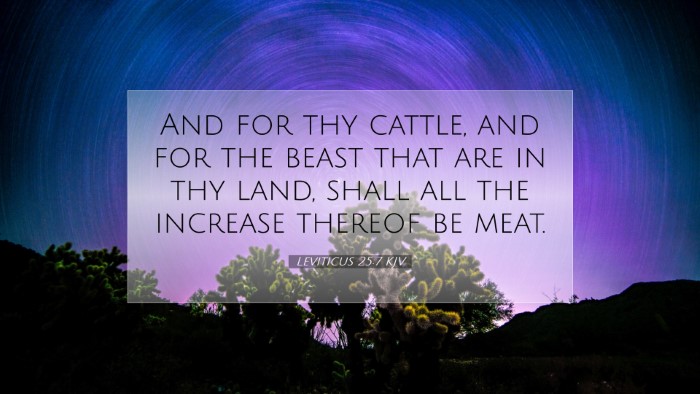Commentary on Leviticus 25:7
Verse: "And the increase of the land shall be meat for your food, and for them of your household, and for your servants, and for your maidens, and for your hired servant, and for your strangers that sojourn with you." (Leviticus 25:7)
Introduction
The verse presents a significant aspect of the agricultural laws given in Leviticus, highlighting God's provision for His people, and establishing a rhythm of work and rest, productivity and dependency on divine grace. It emphasizes not just individual well-being but the communal obligations that arise from shared resources.
Thematic Elements
- Divine Provision: The phrase "the increase of the land" points towards God's ongoing provision for His people. Both Matthew Henry and Albert Barnes emphasize the idea that the harvest is a blessing from God, requiring the proper acknowledgment of His sovereignty.
- Community Welfare: The mention of "your household," "servants," and "strangers" encompasses all members of society, indicating a divine mandate for communal support and care. Adam Clarke notes how this verse underscores social justice within the Israelite community by providing for the needy.
- Rest and Renewal: The broader context of Leviticus 25 elaborates on the concept of the sabbatical year, where the land rests. This principle allows the land to rejuvenate and ensures that sustainability is maintained over generations, reflecting God's design in creation.
Commentary Insights
1. Divine Provision:
Matthew Henry points out that God provides not only for the physical needs of the Israelites but also purposed the increase of the land as a means for spiritual reflection. As they harvest, they should remember the Giver of all good gifts. This reminder helps cultivate gratitude and promotes an attitude of stewardship rather than ownership.
2. Social Responsibility:
Albert Barnes remarks that the equality in access to resources, as stated in this verse, acts as a protective measure against socio-economic disparities. It is a clear indication of God’s desire that all classes of society—masters and servants, natives and foreigners—participate in the blessings of the land. This is fundamentally an issue of biblical justice that reflects the broader themes of care and compassion throughout Scripture.
3. Sabbath Principle:
Adam Clarke elaborates on the significance of the sabbatical concept found throughout this chapter. Resting the land speaks not just to agricultural practices but also symbolizes a deeper reliance on God for provision. Rather than seeing productivity solely through human effort, it invites believers to embrace cycles of rest and renewal which ultimately lead to spiritual and physical well-being.
Theological Implications
The theological implications of Leviticus 25:7 are profound. The mandate for both spiritual and social sustainability challenges modern interpretations of prosperity and success. Here are some key considerations:
- Stewardship: The increase of the land is not merely for personal gain; it reflects a stewardship model where believers are accountable for the welfare of others.
- Interdependence: The interconnectedness highlighted in this verse applies to our contemporary communities, reminding us that our actions affect others—emphasizing that true prosperity is collective.
- Kingdom Values: The care for the marginalized and the emphasis on communal needs reflects the values of God’s Kingdom, which continues to challenge societies structured on individualism and capitalism.
Practical Applications
For pastors and leaders, the insights from Leviticus 25:7 can be applied practically in several ways:
- Ministry of Care: Churches should incorporate elements of social justice and community support into their missions, ensuring that resources are distributed equitably.
- Education on Stewardship: Teachings on stewardship should include not only financial resources but also time, talents, and the environment—encouraging congregants to reflect on how they use God’s gifts.
- Community Engagement: Encourage church members to engage with social issues, formulating outreach programs that resonate with the community’s needs, thus embodying the inclusive spirit captured in this scripture.
Conclusion
Leviticus 25:7, when examined closely, offers rich theological insights into God’s provision, social justice, and the overarching theme of rest. The principles outlined serve as a timeless reminder to believers about their responsibilities not just toward themselves but toward those around them, inviting all into a life that recognizes and honors God’s abundant grace.


